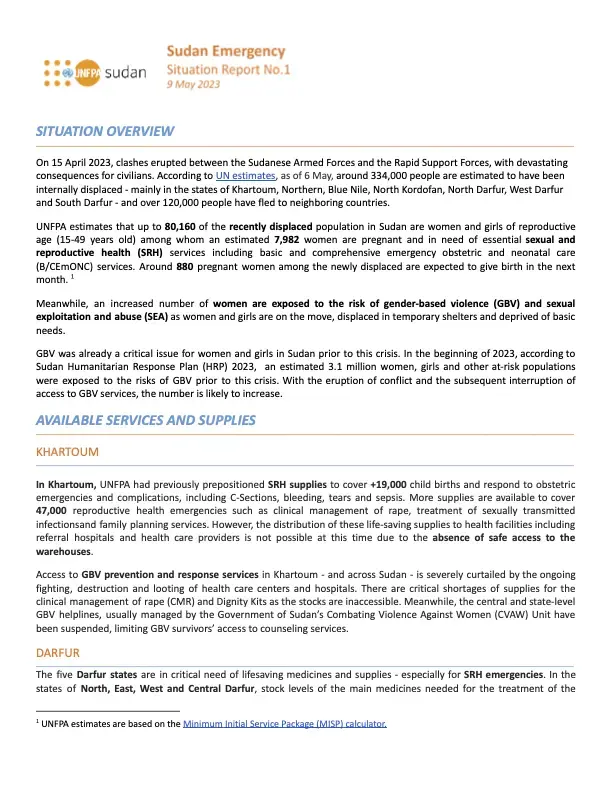Sudan Emergency: Situation Overview
On 15 April 2023, intense fighting erupted between the Sudanese Armed Forces (SAF) and the Rapid Support Forces (RSF), causing widespread devastation. By 6 May, more than 334,000 people were internally displaced across Khartoum, Northern, Blue Nile, North Kordofan, and Darfur states. Additionally, over 120,000 people have fled to neighboring countries, exacerbating the humanitarian crisis.
UNFPA estimates that more than 80,000 women and girls of reproductive age are among the recently displaced, including 7,982 pregnant women in urgent need of sexual and reproductive health (SRH) services. Approximately 880 pregnant women are expected to give birth in the next month, with limited access to life-saving care. The conflict has heightened the risk of gender-based violence (GBV), exacerbating an already dire situation for women and girls in Sudan, where 3.1 million were exposed to GBV risks before the crisis.
Available Services and Supplies
In Khartoum, prepositioned SRH supplies are ready to support over 19,000 childbirths and 47,000 reproductive health emergencies, including clinical management of rape and treatment of sexually transmitted infections. However, distribution remains impossible due to the ongoing conflict. In Darfur, essential medicines and SRH supplies are running critically low, with attacks on medical facilities further depleting stocks.
GBV prevention and response services are severely constrained across Sudan. In Khartoum, many services, including helplines, have been suspended due to insecurity. In Darfur, only a few areas still offer limited GBV case management services. The need for supplies like dignity kits and clinical management of rape kits is becoming increasingly urgent.
UNFPA’s Response Strategy and Priorities
UNFPA is working with partners to provide life-saving SRH and GBV services, despite the challenges. The response includes deploying community midwives, mobile clinics, and temporary health facilities to support deliveries and provide SRH services. Additionally, efforts are being made to establish safe spaces for women and girls, distribute dignity kits, and provide remote GBV counseling in areas where physical services are unavailable. UNFPA’s response is built on strong partnerships and coordinated efforts with national and regional governments, as well as humanitarian partners.


